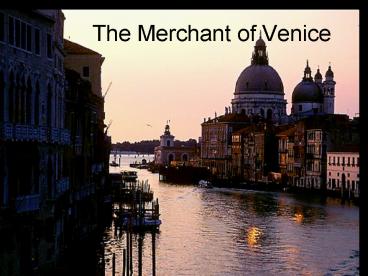The Merchant of Venice - PowerPoint PPT Presentation
1 / 11
Title:
The Merchant of Venice
Description:
The Merchant of Venice Comic Harmony . . . Fairy Tale Qualities Simple oppositions with stock characters (the clown, the blocking figure ) Happy ending with ... – PowerPoint PPT presentation
Number of Views:1376
Avg rating:3.0/5.0
Title: The Merchant of Venice
1
The Merchant of Venice
2
Comic Harmony . . .
- Fairy Tale Qualities
- Simple oppositions with stock characters (the
clown, the blocking figure) - Happy ending with multiple marriages
- Triumph of mercy over law
3
. . .or Tragic Dissonance?
- Imposing, grand central figure of Shylock
- Considered Anti-Semitic by some
- Shades of sexism, racism and implied
homosexuality - Ends with humiliation and mockery
4
About this most controversial of plays
- Written by Shakespeare ca. 1596
- Source Il Pecorone (meaning The Simpleton)
- No play other than Hamlet has been staged more
frequently
5
Setting Venice
- A politically independent state
- Relaxed sexual morals love of pleasure
- Tolerance of different nationalities religions
- A place of great wealth where trade and
exploration was center
6
Historical Context
- Shylock, who is Jewish, highlights historical
contradictions of the time - The Jewish race seen as a necessary evil
- Necessary for trade, capital ventures, and loans
to the state and to kings for exploration wars
7
. . .but also considered evil
- They practiced usury, which was forbidden
- They were wrongly blamed for the crucifixion of
Christ - They were seen as foreign, exotic, threatening
- The Prioresss Tale
8
What about usury?
- From Latin usus, uti, meaning use a sum paid for
the USE of money - (Interest!!)
- Could we live without it?
- Against the law of nature for money to beget
money - Biblical injunctions against it (Luke 630-31)
- Likened to prostitution, another necessary evil
9
Nonetheless, 16th Century Europe desperately
needed this practice of usury
- It was a time of great exploration and expanding
trade - The growing nation-states and kings were always
in need of money - It was absolutely essential for the growth of a
capitalistic economy - There was a debate raging over usury at the time
Shakespeare wrote the play
10
The question remains Was Shakespeare
anti-Semitic?
- His audience probably was, even though they could
not have known any Jews - Jews were expelled from England in 1290 and did
not return until after Shakespeares day - Critics cite the character of Shylock as evidence
both for and against the proposition - Look closely at this portrait by Chandos
- We will revisit this question!
11
- In 1864, the critic J. Hain Friswell wrote in his
Life Portraits of William Shakespeare - One cannot too readily imagine our essentially
English Shakespeare to have been a dark, heavy
man, with a foreign expression, of a decidedly
Jewish physiognomy, thin curly hair, a somewhat
lubricious mouth, red-edged eyes, wanton lips,
with a coarse expression, and his ears tricked
out with ear-rings.































